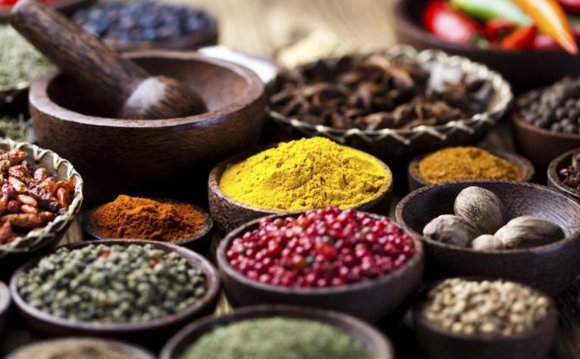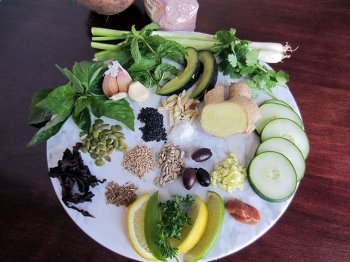
 Photo from: "Eat Well, Be Well: Ayurveda Cooking for Healthy Living” by Lois Leonhardi
Photo from: "Eat Well, Be Well: Ayurveda Cooking for Healthy Living” by Lois Leonhardi
Vata is balanced by a diet of freshly cooked, whole foods that are soft or mushy in texture, rich in protein and fat, seasoned with a variety of warming spices, and served warm or hot. These foods calm vata by lubricating and nourishing the tissues, preserving moisture, and maintaining warmth, all while supporting proper digestion and elimination. What follows are some specific principles that we hope will empower you in discovering a vata pacifying diet that works for you.
Qualities to Favor and Avoid
Vata is cool, dry, rough and light, so eating foods that neutralize these qualities – foods that are warm, moist, oily, smooth, and nourishing – can help to balance excess vata. This section offers a closer look at the qualities of various foods. An improved understanding of these qualities can guide you in making specific dietary choices that will better support vata.
Favor Warm Over Cold
The warm quality can be emphasized by eating foods that are warm in temperature, foods that have a warming energetic, and by using warming spices generously (most vata pacifying spices are warming… see our list below). On the other hand, it is best to avoid foods with a cooling energetic, cold and frozen foods or drinks, carbonated drinks, large quantities of raw fruits and vegetables, and even leftovers that have been kept in the refrigerator or freezer. The cold quality is inherently increased in these foods, even if they are served hot.
Favor Moist and Oily Over Dry
Vata’s dryness is offset by eating cooked rather than raw foods, by cooking and garnishing foods with generous amounts of high-quality oils or ghee, and by staying hydrated. Drink plenty of fluids, ideally warm or hot – but no cooler than room-temperature. In addition, moist foods like berries, melons, summer squash, zucchini, and yogurt help offset vata’s dry quality, as can hydrating preparations such as soups or stews. Oily foods like avocado, coconut, olives, buttermilk, cheese, eggs, whole milk (preferably non-homogenized), wheat, nuts and seeds are generally supportive as well. Avoid exceptionally drying foods like popcorn, crackers, white potatoes, beans, and dried fruits.
RELATED VIDEO











